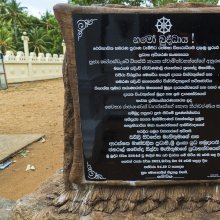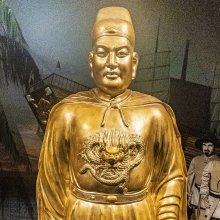Pramukha: 19 definitions
Introduction:
Pramukha means something in Buddhism, Pali, Hinduism, Sanskrit, Jainism, Prakrit, the history of ancient India, Marathi, Hindi. If you want to know the exact meaning, history, etymology or English translation of this term then check out the descriptions on this page. Add your comment or reference to a book if you want to contribute to this summary article.
Alternative spellings of this word include Pramukh.
Images (photo gallery)
In Hinduism
Jyotisha (astronomy and astrology)
Source: Wisdom Library: Brihat Samhita by VarahamihiraPramukha (प्रमुख) refers to the “beginning” (of a year), according to the Bṛhatsaṃhitā (chapter 8), an encyclopedic Sanskrit work written by Varāhamihira mainly focusing on the science of ancient Indian astronomy astronomy (Jyotiṣa).—Accordingly, “The twelve yugas of Jupiter’s cycle are known as belonging to the Devas. [...] Generally in every yuga, there will be good rain in the first year and at the beginning [i.e., pramukha] of the second year; excessive rain in the third year; moderate rain at the end (of the rainy season) of the fourth year; and slight rain in the fifth year. In the first four yugas there will be prosperity in the land; in the next or middle four there will not be much of it; and in the last four mankind will suffer miseries”.

Jyotisha (ज्योतिष, jyotiṣa or jyotish) refers to ‘astronomy’ or “Vedic astrology” and represents the fifth of the six Vedangas (additional sciences to be studied along with the Vedas). Jyotisha concerns itself with the study and prediction of the movements of celestial bodies, in order to calculate the auspicious time for rituals and ceremonies.
Purana and Itihasa (epic history)
Source: archive.org: Shiva Purana - English TranslationPramukha (प्रमुख) refers to the “eldest (of brothers)”, according to the Śivapurāṇa 2.3.30 (“The Celebration of Pārvatī’s Return”).—Accordingly, as Brahmā narrated to Nārada: “On hearing that Pārvatī was returning, Menā and Himavat excessively delighted went ahead seated in a divine vehicle. [...] The chief priest, the citizens, the maids, the kinsmen and also others accompanied them. All the brothers with Maināka, the eldest (pramukha), accompanied them highly delighted and crying shouts of victory. [...]”.

The Purana (पुराण, purāṇas) refers to Sanskrit literature preserving ancient India’s vast cultural history, including historical legends, religious ceremonies, various arts and sciences. The eighteen mahapuranas total over 400,000 shlokas (metrical couplets) and date to at least several centuries BCE.
In Buddhism
Mahayana (major branch of Buddhism)
Source: De Gruyter: A Buddhist Ritual Manual on AgriculturePramukha (प्रमुख) refers to the “foremost (of Nāgas)”, according to the Vajratuṇḍasamayakalparāja, an ancient Buddhist ritual manual on agriculture from the 5th-century (or earlier), containing various instructions for the Sangha to provide agriculture-related services to laypeople including rain-making, weather control and crop protection.—Accordingly, [after Sāgara filled the lotus-lake with rain-showers], “Then in that region a great opportunity occurred. The Bhagavān sat down in that region, in the middle of a great assembly he was surrounded and honoured, there was a great assembly of Nāgas, namely 80,000 great Nāga kings gathered, having Sāgara, the Nāga king, as their foremost (pramukha)”.

Mahayana (महायान, mahāyāna) is a major branch of Buddhism focusing on the path of a Bodhisattva (spiritual aspirants/ enlightened beings). Extant literature is vast and primarely composed in the Sanskrit language. There are many sūtras of which some of the earliest are the various Prajñāpāramitā sūtras.
In Jainism
General definition (in Jainism)
Source: The University of Sydney: A study of the Twelve ReflectionsPramukha (प्रमुख) refers to the “multitudes (of lives)”, according to the 11th century Jñānārṇava, a treatise on Jain Yoga in roughly 2200 Sanskrit verses composed by Śubhacandra.—Accordingly, “ [com.—Next he speaks about the transience (anityatām) of multitudes of lives (āyuḥpramukhāṇām)]—Truly, life perishes exceedingly quickly like water lying in the hand [and] youth perishes like snow passes from the petal of a lotus”.

Jainism is an Indian religion of Dharma whose doctrine revolves around harmlessness (ahimsa) towards every living being. The two major branches (Digambara and Svetambara) of Jainism stimulate self-control (or, shramana, ‘self-reliance’) and spiritual development through a path of peace for the soul to progess to the ultimate goal.
India history and geography
Source: Cologne Digital Sanskrit Dictionaries: Indian Epigraphical GlossaryPramukha.—(CII 4), a member of the executive committee of a corporation. (EI 28), probably the same as Pradhānin. Note: pramukha is defined in the “Indian epigraphical glossary” as it can be found on ancient inscriptions commonly written in Sanskrit, Prakrit or Dravidian languages.

The history of India traces the identification of countries, villages, towns and other regions of India, as well as mythology, zoology, royal dynasties, rulers, tribes, local festivities and traditions and regional languages. Ancient India enjoyed religious freedom and encourages the path of Dharma, a concept common to Buddhism, Hinduism, and Jainism.
Languages of India and abroad
Marathi-English dictionary
Source: DDSA: The Molesworth Marathi and English Dictionarypramukha (प्रमुख).—a (S) Chief, main, principal: also best or most excellent. 2 In comp. Leading, taking the lead or head of. Ex. viṣṇu pramukhadēva mahādēvāpāsīṃ gēlē.
Source: DDSA: The Aryabhusan school dictionary, Marathi-Englishpramukha (प्रमुख).—a Chief. Best. Leading.
Marathi is an Indo-European language having over 70 million native speakers people in (predominantly) Maharashtra India. Marathi, like many other Indo-Aryan languages, evolved from early forms of Prakrit, which itself is a subset of Sanskrit, one of the most ancient languages of the world.
Sanskrit dictionary
Source: DDSA: The practical Sanskrit-English dictionaryPramukha (प्रमुख).—a.
1) Facing, turning the face towards.
2) Chief, principal, foremost, first.
3) Respectable, honourable.
4) (At the end of comp.) (a) Headed by, having as chief or at the head; वासुकिप्रमुखाः (vāsukipramukhāḥ) Ku. 2.38. (b) Accompanied with; प्रीतिप्रमुखवचनं स्वागतं व्याजहार (prītipramukhavacanaṃ svāgataṃ vyājahāra) Meghadūta 4.
-khaḥ 1 A respectable man.
2) A heap, multitude.
3) The tree called Punnāga.
-kham 1 The mouth.
2) The beginning of a chapter or section.
3) The time being, the present. (pramukhatas and pramukhe are used adverbially in the sense of 'in front of', 'before', 'opposite to'; bhīṣmadroṇapramukhataḥ sarveṣāṃ ca mahīkṣitām Bhagavadgītā (Bombay) 1.25; Ś.7.22.).
Source: Cologne Digital Sanskrit Dictionaries: Shabda-Sagara Sanskrit-English DictionaryPramukha (प्रमुख).—mfn.
(-khaḥ-khā-khaṃ) 1. Chief, principal. 2. Best, most excellent. 3. First. m.
(-khaḥ) 1. A chief, a sage, any respectable man. 2. A heap, a multitude. 3. A tree used in dying, (Rottleria tinctoria.) n.
(-khaṃ) 1. Time being, the present. 2. The mouth. 3. Beginning of a chapter or section. f.
(-khā) Facing. E. pra before, mukha the face, &c.
Source: Cologne Digital Sanskrit Dictionaries: Benfey Sanskrit-English DictionaryPramukha (प्रमुख).—[pra-mukha], adj., f. khā. I. adj. 1. First, [Uttara Rāmacarita, 2. ed. Calc., 1862.] 34, 6. 2. Chief, [Hitopadeśa] iii. [distich] 83. 3. Best. Ii. n. Mouth, [Johnson's Selections from the Mahābhārata.] 15, 55 (cf. p. 39, n.). Iii. khe, loc., adverbially. 1. In presence, [Śākuntala, (ed. Böhtlingk.)] [distich] 181. 2. In front,
Pramukha (प्रमुख).—([feminine] ī) turning the face towards, facing ([accusative]); foremost, first, principal, best; often —° having as first or chief, headed by, — and so on. °— before one’s face, publicly; [locative] & tas as [preposition] [with] [genetive] or —°.
Source: Cologne Digital Sanskrit Dictionaries: Monier-Williams Sanskrit-English Dictionary1) Pramukha (प्रमुख):—[=pra-mukha] mfn. turning the face towards, facing ([accusative]), [Rāmāyaṇa]
2) [v.s. ...] first, foremost, chief, principal, most excellent, [Hitopadeśa]
3) [v.s. ...] (generally ifc.; f(ā). ) having as foremost or chief, headed or preceded by, accompanied by or with (cf. prīti-p; vasiṣṭhap), [Mahābhārata; Kāvya literature]
4) [v.s. ...] honourable, respectable, [cf. Lexicographers, esp. such as amarasiṃha, halāyudha, hemacandra, etc.]
5) [v.s. ...] m. a chief, respectable man, sage, [Horace H. Wilson]
6) [v.s. ...] a heap, multitude, [cf. Lexicographers, esp. such as amarasiṃha, halāyudha, hemacandra, etc.]
7) [v.s. ...] Rottleria Tinctoria, [cf. Lexicographers, esp. such as amarasiṃha, halāyudha, hemacandra, etc.]
8) [v.s. ...] n. the mouth, [Monier-Williams’ Sanskrit-English Dictionary]
9) [v.s. ...] commencement (of a chapter), [Bṛhad-āraṇyaka-upaniṣad; Śaṃkarācārya]
10) [v.s. ...] time being, the present, the same time, [Pratāparudrīya]
11) [v.s. ...] n. ([in the beginning of a compound] or khe ind.) before the face of, in front of, before, opposite to (with [genitive case] or [compound]), [Mahābhārata; Kāvya literature]
12) [v.s. ...] n. (with √kṛ) to cause to go before or precede, [Rāmāyaṇa]
Source: Cologne Digital Sanskrit Dictionaries: Yates Sanskrit-English DictionaryPramukha (प्रमुख):—[pra-mukha] (khaḥ-khā-khaṃ) a. Chief, best, first. m. A chief; a heap; Rottleria tinctoria. n. Time present.
Source: DDSA: Paia-sadda-mahannavo; a comprehensive Prakrit Hindi dictionary (S)Pramukha (प्रमुख) in the Sanskrit language is related to the Prakrit word: Pamuha.
[Sanskrit to German]
Sanskrit, also spelled संस्कृतम् (saṃskṛtam), is an ancient language of India commonly seen as the grandmother of the Indo-European language family (even English!). Closely allied with Prakrit and Pali, Sanskrit is more exhaustive in both grammar and terms and has the most extensive collection of literature in the world, greatly surpassing its sister-languages Greek and Latin.
Hindi dictionary
Source: DDSA: A practical Hindi-English dictionaryPramukha (प्रमुख) [Also spelled pramukh]:—(a) chief; foremost; leading, outstanding, principal; ~[tā] dominance, eminence, state of being foremost/outstanding, supremacy.
...
Kannada-English dictionary
Source: Alar: Kannada-English corpusPramukha (ಪ್ರಮುಖ):—
1) [adjective] placed or being in front; facing; meeting or met face to face.
2) [adjective] having much significance, consequence or value; important.
3) [adjective] having or acting as if having, power, authority, influence, high position, etc.; important.
4) [adjective] and others; and the like; and the rest; and so forth; (used to indicate that more of the same sort or class might have been mentioned, but for brevity have been omitted).
--- OR ---
Pramukha (ಪ್ರಮುಖ):—
1) [noun] that which is superior, excellent in quality, merit, etc.
2) [noun] the head or leader of a group organization, etc.
3) [noun] (myth.) name of a hell.
4) [noun] a group of people assembled at a place; a group; a multitude.
Kannada is a Dravidian language (as opposed to the Indo-European language family) mainly spoken in the southwestern region of India.
Nepali dictionary
Source: unoes: Nepali-English DictionaryPramukha (प्रमुख):—adj. 1. chief; principal; prominent; 2. dominant; n. chief person; leader; leading official distinguished person;
Nepali is the primary language of the Nepalese people counting almost 20 million native speakers. The country of Nepal is situated in the Himalaya mountain range to the north of India.
See also (Relevant definitions)
Starts with: Pramukha-adhikari, Pramukha-adhikrita, Pramukha-atithi, Pramukha-calaka, Pramukha-jilla-adhikari, Pramukha-sabha, Pramukha-sacetaka, Pramukha-saciva, Pramukha-senani, Pramukha-sthapati, Pramukhakarana, Pramukhara, Pramukhata, Pramukhatas, Pramukhatva.
Ends with: Apramukha, Ayushpramukha, Ganapramukha, Kyampasa-pramukha, Nagarapramukha, Pariksha-pramukha, Pritipramukha, Rajapramukha, Samatyapramukha, Vara-pramukha, Vasishthapramukha, Vibhagiya-pramukha, Yojanapramukha.
Full-text (+14): Pramukhatva, Pramukhatas, Pritipramukha, Pramukhata, Pritipramukhavacana, Nayacara, Pramukhe, Pariksha-pramukh, Kyampasa-pramukha, Pramukha-calaka, Pamuha, Kyampus-pramukh, Pramukh-sachetak, Pramukh-sabha, Vara-pramukha, Sampramukhita, Samatyapramukha, Pramukhya, Piramukam, Vasishthapramukha.
Relevant text
Search found 9 books and stories containing Pramukha, Pra-mukha; (plurals include: Pramukhas, mukhas). You can also click to the full overview containing English textual excerpts. Below are direct links for the most relevant articles:
Prasthanatrayi Swaminarayan Bhashyam (Study) (by Sadhu Gyanananddas)
4.3.1. The cause of Pramāṇa and Pramā < [Chapter 2 - Analysis on the Basis Of Epistemology]
5. Guruparampara in Svāminārāyaṇa Faith: A Live Philosophy < [Chapter 1 - Introduction]
Amarakoshodghatana of Kshirasvamin (study) (by A. Yamuna Devi)
Education (8): Knowledge of Metres and Figures of speech < [Chapter 4 - Cultural Aspects]
Charaka Samhita and Sushruta Samhita (by Nayana Sharma)
Rudra-Śiva in the Medical Texts < [Chapter 8]
Dipavamsa (study) (by Sibani Barman)
Maha Prajnaparamita Sastra (by Gelongma Karma Migme Chödrön)
Kalidasa the Playwright different from < [July – September, 1999]
Reviews < [April – June, 1988]
Book Reviews < [July – September, 1989]

